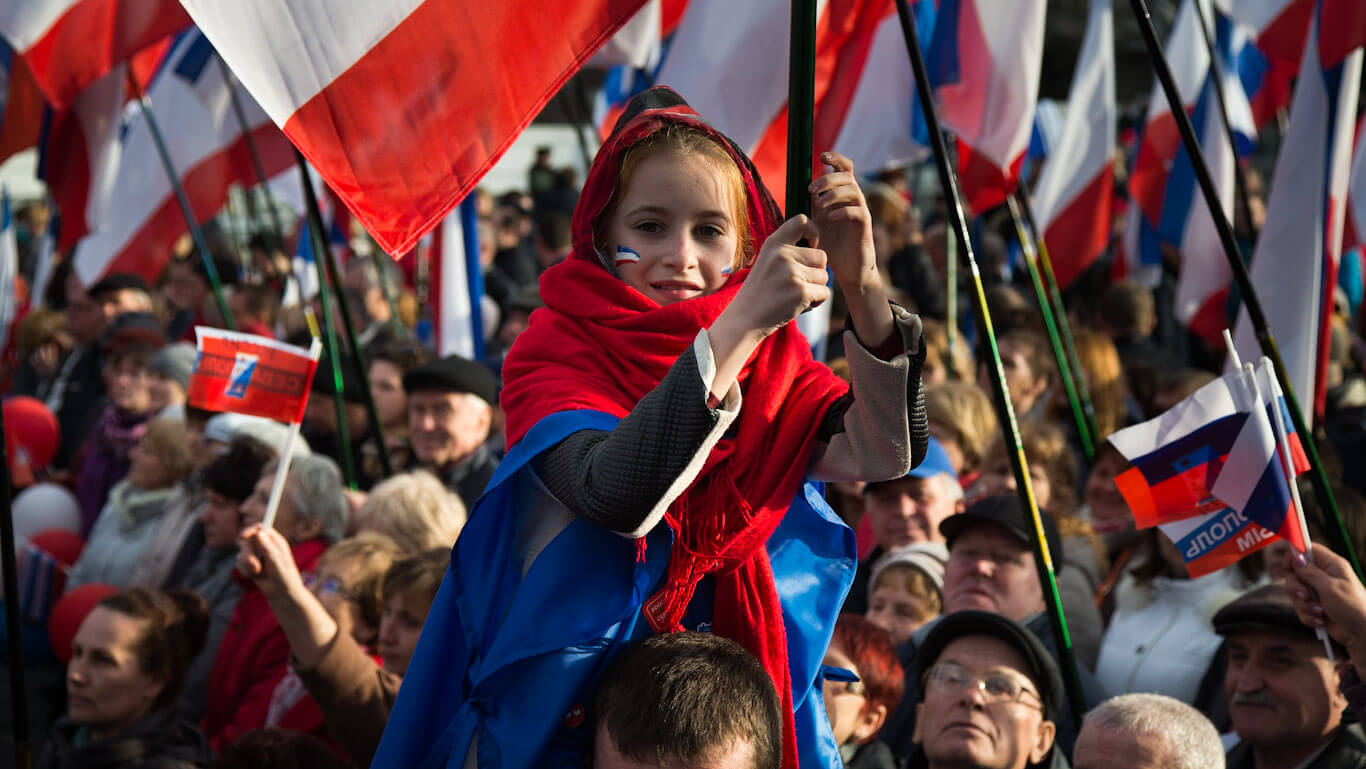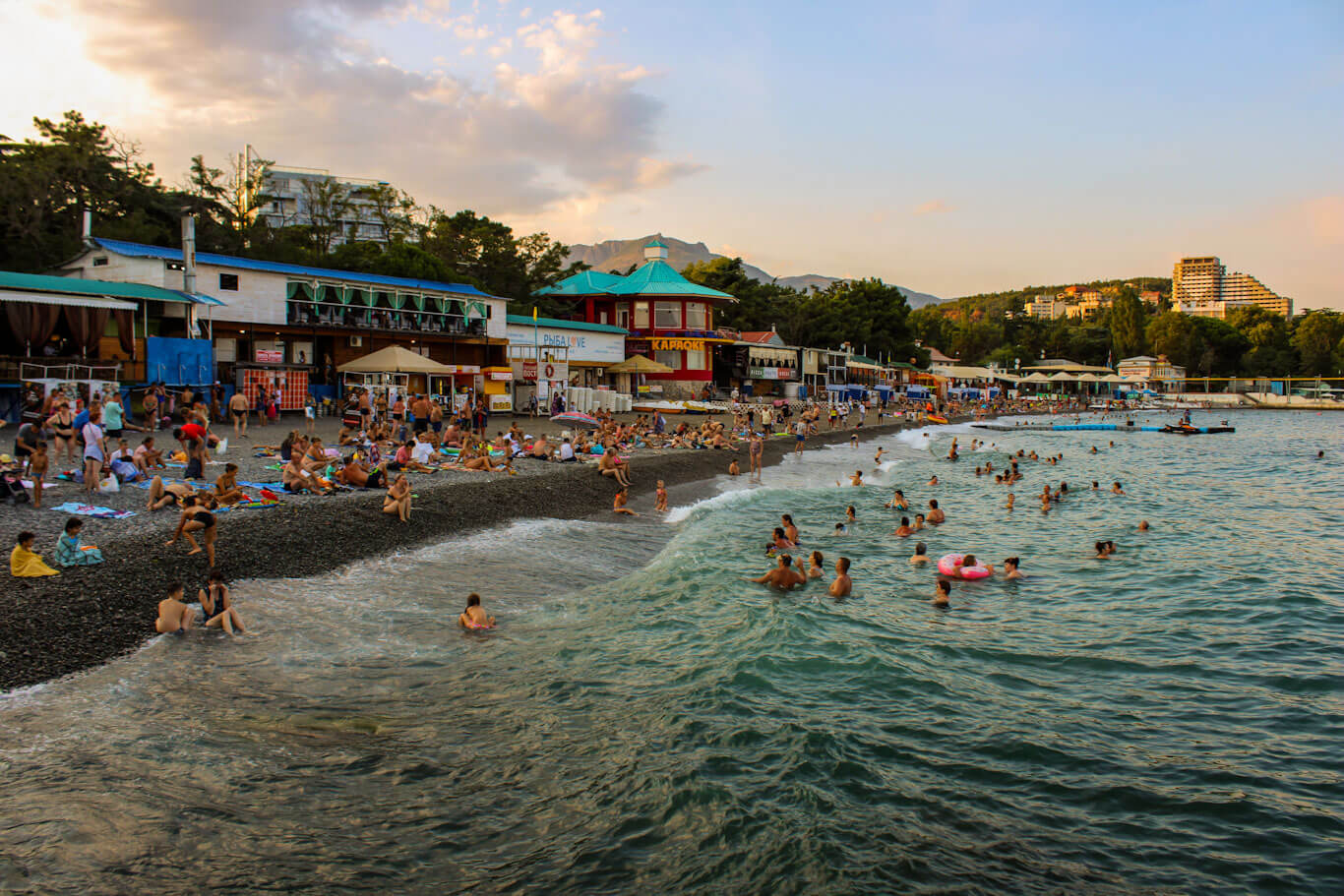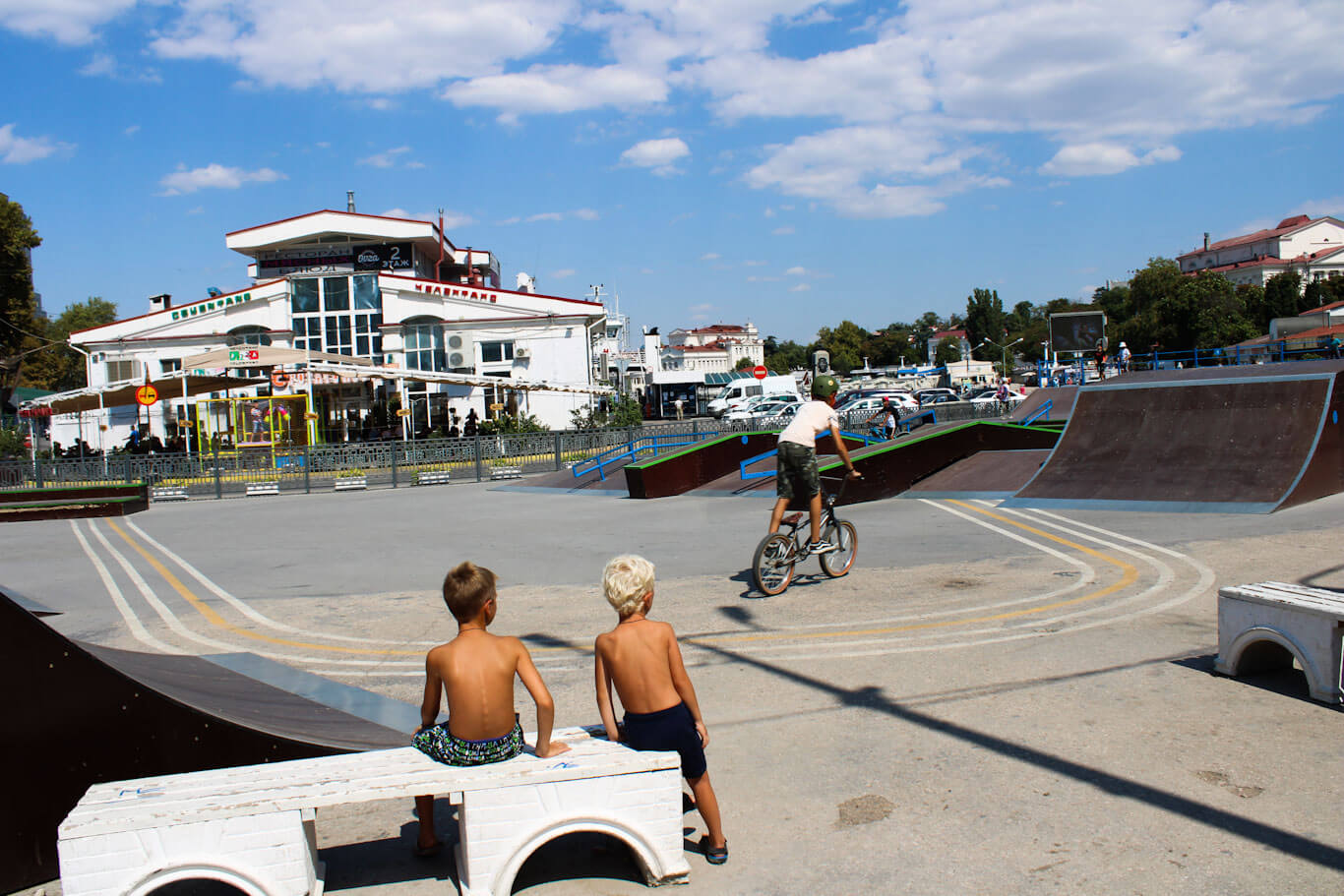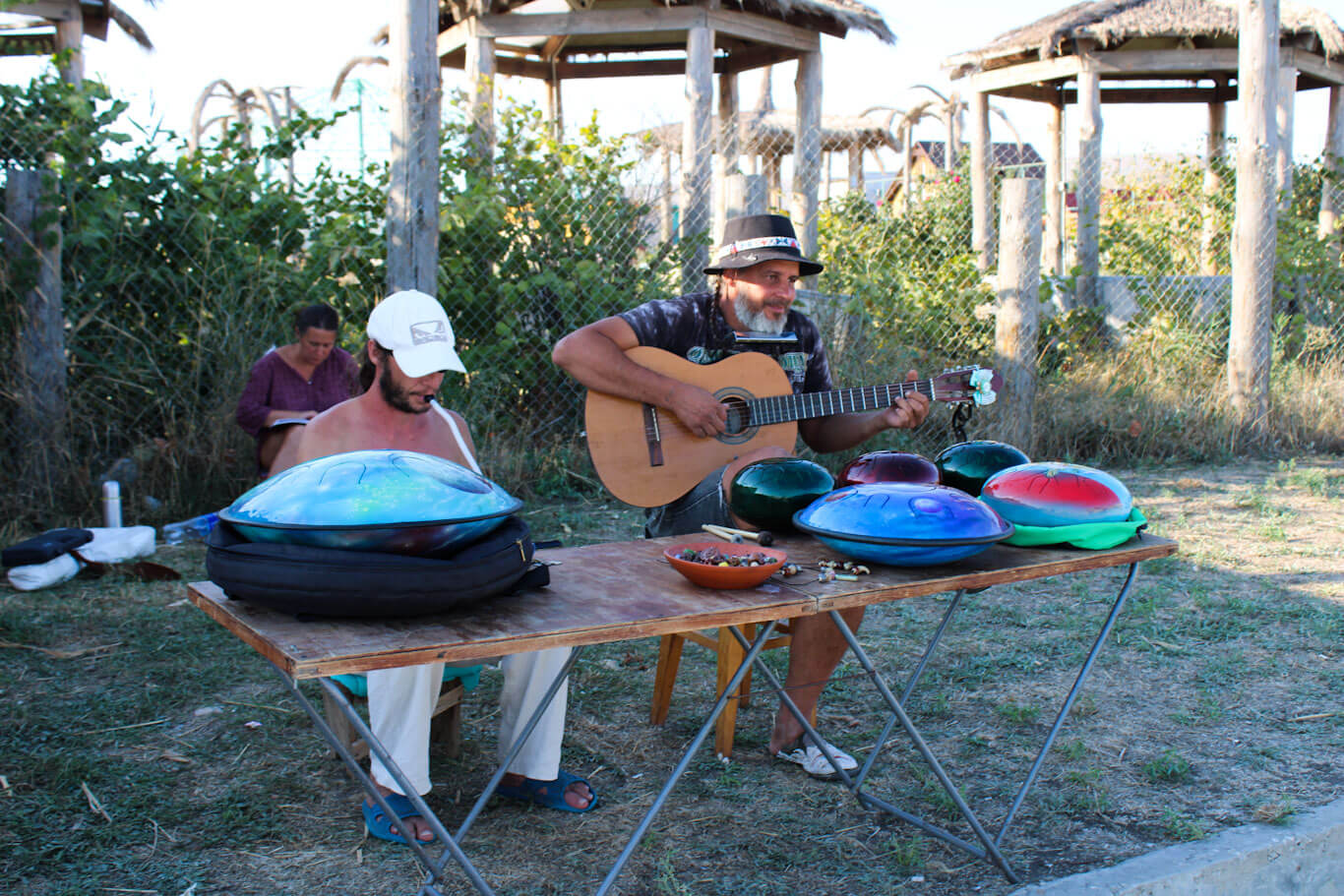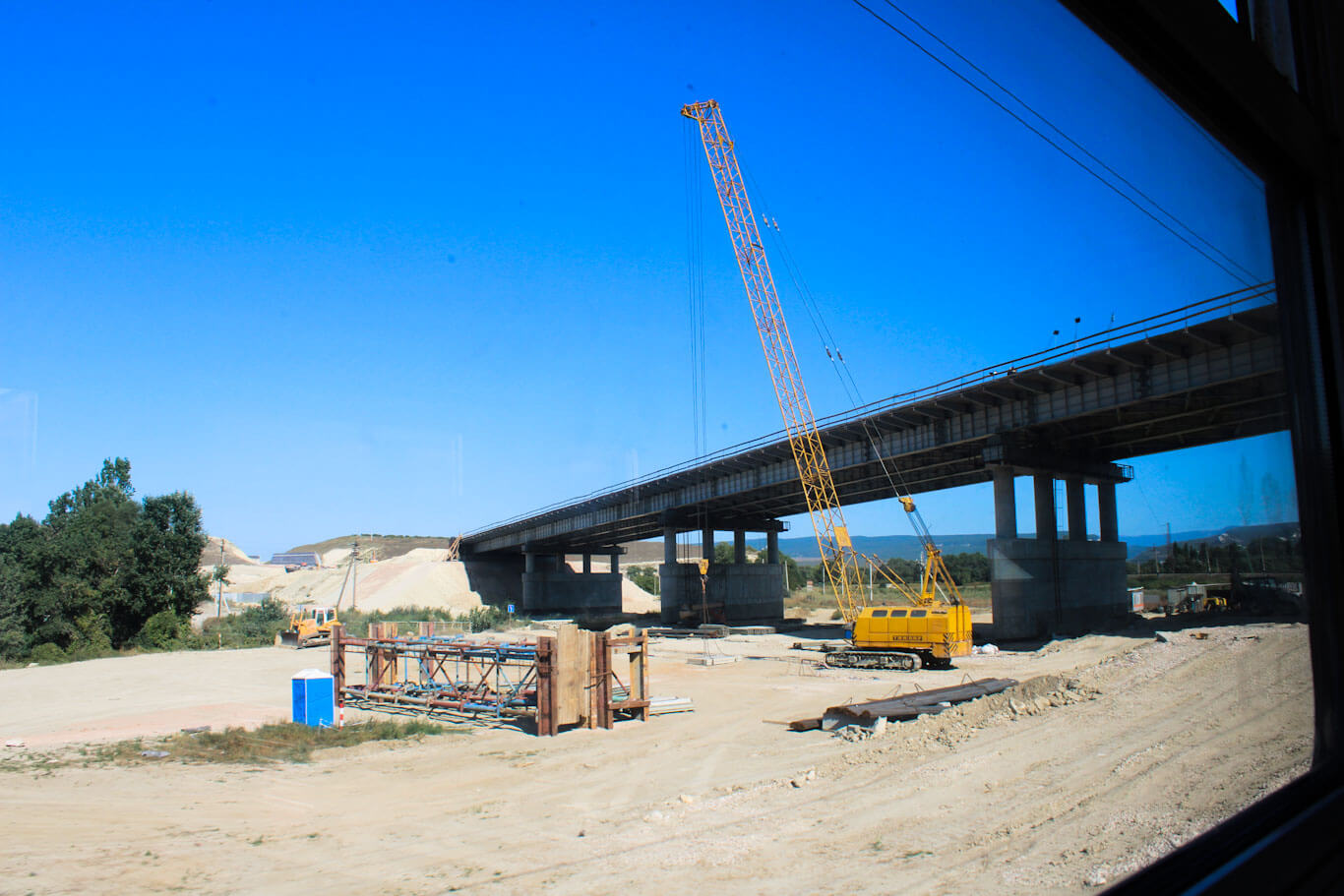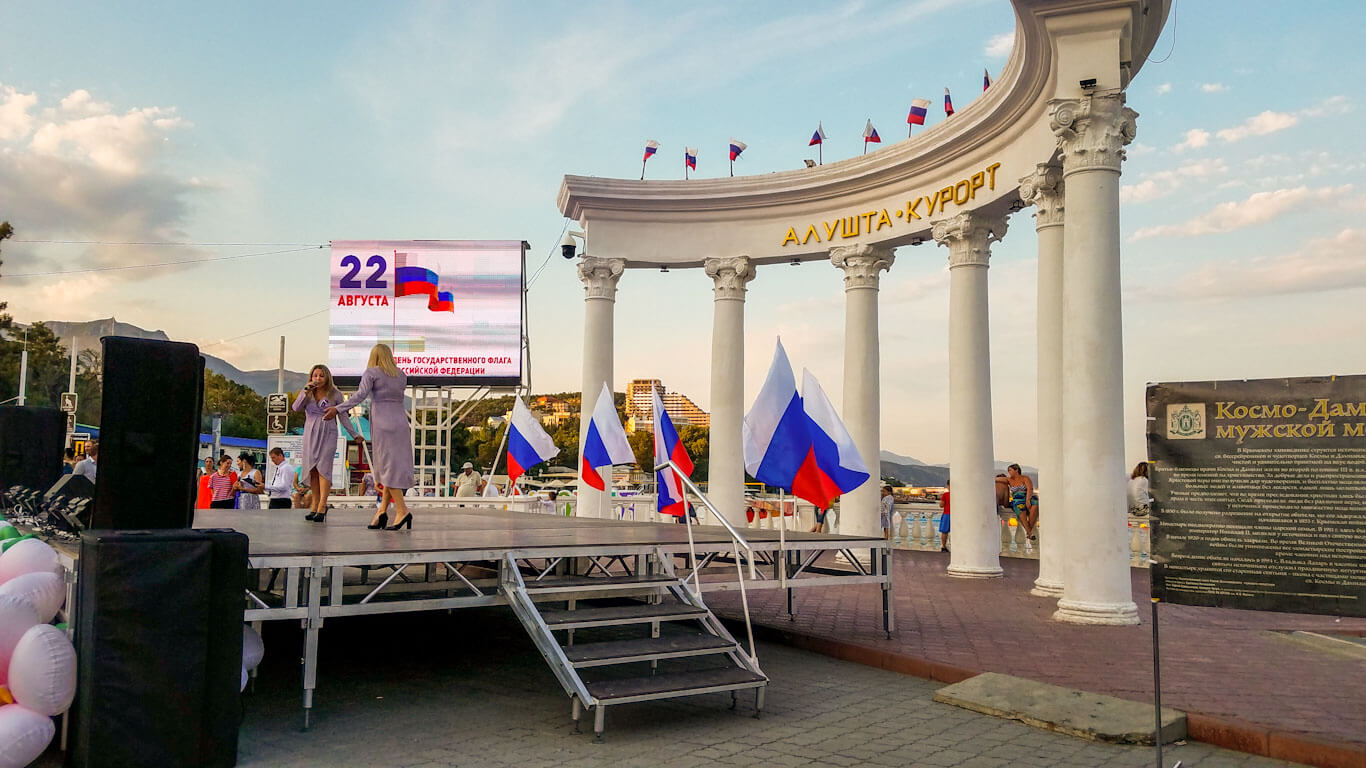Zoals je
wellicht wel weet, erger ik me kapot aan het enorme leugencliché dat De Krim is geannexeerd door de Russen en dat het daar
gehouden referendum werd gemanipuleerd door de Russen, die tijdens
het referendum met grote aantallen militairen op straat zouden zijn gezien...... Niets van waar, bovendien hebben internationale waarnemers het referendum gecontroleerd en zij stelden dat het referendum eerlijk en goed was verlopen.......
Eva
Bartlett, de bekende onderzoeks- en oorlogsjournalist uit de VS ging
op reis om e.e.a. te onderzoeken. Ze sprak met mensen die al
generaties in De Krim wonen, de oorspronkelijke bevolking van De Krim, Oekraïners (mensen die voorheen in Oekraïne woonden), etnische Russen en anderen, waarbij ze telkens weer hetzelfde verhaal te horen kreeg: men wilde zich aansluiten bij Rusland.
Niet voor niets leefde die wens onder de bevolking, zeker als je de staat van de
infrastructuur zag (van wegen t/m de havens en het vliegveld van Simferopol) ten tijde van
het Oekraïense bestuur: enorm veel gaten in de wegen, alles afgeragd
en slecht onderhouden, Kiev stak dan ook geen geld in De Krim..... Ook de bouw van ziekenhuizen en crèches bleef ver achter bij de behoefte daaraan..... Uit
eerdere berichtgeving (al van voor de opstand) weet ik dat men
destijds stemde voor Janoekovytsj, die beloofde e.e.a. op te knappen, bovendien wilde hij vriendschappelijke banden met Rusland onderhouden, waarbij Oekraïne zelfs een verdrag werd aangeboden, dat in tegenstelling tot een verdrag met de EU, uiterst lucratief zou zijn geweest (iets dat de VS zo stak dat het
de opstand in Oekraïne organiseerde en regisseerde*).
De
opstand eindigde met het afzetten van Janoekovytsj en het installeren
van een VS vriendelijk dictatuur o.l.v. de zwaar corrupte Porosjenko,
bovendien een neonazi....... Dit was voor de bevolking van de Krim en de
bevolking van de Donbass-regio het sein om een punt achter de relatie
met Oekraïne te zetten, immers de door hen gekozen president werd
afgezet en vervangen door een fascistische junta......
Lees het
volgende mooie reisverslag waarin diverse mensen stellen dat men
volkomen achter het besluit staat tot aansluiting bij Rusland en dat Rusland in de paar jaar dat Oekraïne zich aansloot zo ongeveer gehele infrastructuur heeft
vernieuwd dan wel opgeknapt....... Lees het verhaal en onthoud dat
als je weer eens hoort over de 'annexatie' van De Krim en de 'Russian
backed rebels' die samen met het Russische leger zouden vechten in de
Donbass-regio, waar het Porosjenko regime enorme oorlogsmisdaden
heeft begaan, oorlogsmisdaden als het bombarderen van steden en dat
NB door neonazi-bataljons, om nog maar te zwijgen over de schuld van de Porosjenko junta voor het neerhalen van MH17.....
Zegt het
voort mensen, de leugenbrij en anti-Russische propaganda moet
eindelijk worden gestopt!! (en vergeet niet dat zoals gezegd ook rampvlucht MH17
onderdeel is geworden van die leugenbrij.....)
THE
ROAD TO CRIMEA
Eva
Bartlett traveled to Crimea to see firsthand out how Crimeans have
fared since 2014 when their country reunited with Russia, and what
the referendum was really like.
SIMFEROPOL,
CRIMEA — In
early August I traveled to Russia for the first time, partly out of
interest in seeing some of the vast country with a tourist’s eyes,
partly to do some journalism in the region. It also transpired that
while in Moscow I was able to interview
Maria Zakharova,
spokeswoman of the Foreign Ministry.
High
on my travel list, however, was to visit Crimea and Donetsk People’s
Republic (DPR) — the former a part of Russia, the latter an
autonomous republic in the east of Ukraine, neither accurately
depicted in Western reporting. Or at least that was my sense looking
at independent journalists’ reports and those in Russian media.
Both
regions are native Russian-speaking areas; both opted out of Ukraine
in 2014. In the case of Crimea, joining Russia (or
actually rejoining, as most I spoke to in Crimea
phrased it) was something people overwhelmingly supported. In the
case of the Donbass region, the turmoil of Ukraine’s Maidan coup in
2014 set things in motion for the people in the region to declare
independence and form the Donetsk and Lugansk People’s Republics.
In
March 2014, Crimeans held a referendum during which 96 percent
of voters chose
to join Russia.
This has been heavily disputed in Western media, with claims that
Crimeans were forced to hold the referendum and claims of Russian
troops on the streets “occupying” the peninsula.
Because
Western media insisted the referendum was a sham held under duress,
and because they bandy about the term “pro-Russian separatists”
for the people of the DPR, I decided to go and speak to people in
these areas to hear what they actually want and feel.
From
the Russian mainland to the Crimean Peninsula
From
St. Petersburg, where I spent a few touristy days, I booked a flight
to Simferopol, the capital of Crimea, and on August 22 I landed at
the attractive new airport. A Russian-American friend, Vlad, flies in
from Moscow and together we rent a car and drive to Alushta, a
tourist-packed seaside area to the south.
As
we drive from the airport, Vlad can’t get over the changes in the
airport, which had been dank and barely functional when he last
visited:
"When
I came here at the end of 2014, Simferopol Airport was very dated:
small and stuffy, low ceilings, small windows; the bathrooms didn’t
work, there was a constant stench in the air, and many facilities
weren’t working — even the baggage carousels didn’t work
properly. There were no restaurants or cafes, and no places to rent
taxis. Now, it’s a world-class international airport.”
We
drive south along smooth roads, passing endless vineyards on either
side, flanked by low mountains. As Vlad drives, he comments on the
condition of the roads, which five years prior were so rough “you
had to swerve to dodge the potholes.”
Descending
to the coast, along cypress tree-lined streets, we arrive in the hub
of Alushta, park, and stroll along the seaside. The beach scenes
could be anywhere: people sunbathing and swimming, jet-skiing,
drinking beer and eating. In the touristy hub before the beach, a
carnival sort of feel and smell, a man playing the accordion,
children’s rides, upscale restaurants, and fast-food stalls.
Revelers
enjoy the pristine Black Sea waters of Alushta. Photo | Eva Bartlett
As
it happens, we arrive on Russia’s National Flag Day and while
walking we come across a small event celebrating this with singers on
stage and a crowd that, when we pass by again some hours later, has
grown in size and enthusiasm.
I
remark on how kind and gentle people are here, just as in Russia.
Vlad replies:
"It
shouldn’t be surprising — people are people anywhere. But Western
media conditions us with stereotypes of Russians as cold and hard,
vilifying an entire nation.”
The
coastal city of Yalta lies further west along the peninsula. The
drive there the following day is more beautiful still, the road
flanked by mountains to one side, hills cascading down to the Black
Sea on the other, endless wineries and, before Yalta itself, the
stunning cliff-top castle known as “Swallow’s Nest.”
In
the evening, we stay in the home of Vlad’s friend Tata, a Russian
woman who moved to Crimea in 2012.
Since
there was so much hype in Western media about a Russian takeover of
the peninsula, I ask the burning questions: Were Crimeans forced to
take part in the referendum? What was the mood like around that time?
Tata replied:
"I
never saw so many people in my life go out to vote, of their own free
will. There was a period before the referendum, maybe about two
months, during which there were two holidays: International Women’s
Day, March 8, and Defender of the Fatherland Day, February 23.
Normally,
people would go away on vacation during these holidays. But that
year, Crimeans didn’t go anywhere; they wanted to be sure they were
here during the referendum. We felt the sense of a miracle about to
happen. People were anxiously awaiting the referendum.
There
were military tents in the city, but they were not erected by the
military, but by local men. They would stand there every day, and
people could come and sign a document calling for a referendum.
I
went one day and asked if I could add my name but I couldn’t,
because I have a Russian passport. Only Crimean citizens could sign
it. This was the fair way to do it.
At
that time, my husband was in America. One day, he was watching CNN
and got scared and called me because he saw reports of soldiers in
the streets, an ‘invasion’ by Russia.
The
local navy came from Sevastopol to Yalta and anchored their ships off
the coast, made a blockade to ensure no larger Ukrainian or other
ships could come and attack.
But
I never saw tanks, I never saw Russian soldiers. I never saw any of
that in the city.”
Young
boys enjoy a local skate park in Sevastopool. Photo | Eva Bartlett
I
asked Tata about how life had changed after the referendum:
"When
I came here in December 2012, everything was dilapidated and run
down. The nice roads you were driving on, they didn’t exist when we
were a part of Ukraine. I didn’t understand why Crimea was still a
part of Ukraine. It was Russian land ever since the Tsars, the
imperial time of Russia. This is where the Russian soul is, and the
soul of the Russian navy.
After
the Soviet Union collapsed, it wasn’t the will of the Crimean
people to join Ukraine. People were always Russian here; they always
identified as Russian. Ukraine understood this well, and put nothing
into Crimea, as punishment. Ukraine didn’t build any hospitals,
kindergartens or roads.
In
the past four years, the Crimean government has built 200 new
kindergartens. This is the most obvious example of how things have
improved. They also built the new Simferopol airport.
I
worked in aviation. It took three years to build an airport of this
standard in Yekaterinburg, Russia. It took half a year in
Simferopol.”
International
Jazz Festival
On
my third day in Crimea, we drive eastward anew, driving for hours
through the gorgeous countryside, along winding and rolling roads
flanked by jagged mountains, past an exceptionally beautiful church
(Nicholas Church Lighthouse) overlooking the coast, and down along
the sea through more touristy seaside towns and past lines of day
tents along the beach. The local FM radio plays a variety of both
Russian and Western songs.
Finally,
after night falls, we drive into the city of Koktebel, where an
annual Jazz Festival is starting.
Buskers
entertain passersby at the annual Koktebel Jazz Festival. Photo | Eva
Bartlett
During
all these hours of driving, the roads are smooth and well-trafficked,
and I don’t see a single Russian military vehicle.
The
next day, I walk through Koktebel, taking in the local markets
brimming with produce, cheeses, and other goods, and every so often
come across a streetside stand laden with fresh fruits. In the late
afternoon, I walk along the sea, past packed beaches, and meet with a
Crimean woman, Yaroslava, who lives in Austria but every summer
returns to her beloved Crimea. She is ardently supportive of the
decision to have joined Russia and spends much of her time back in
Austria trying to educate people on why Crimeans wanted to be a part
of Russia.
These
are reasons I hear throughout my travels in Crimea: We wanted to
be able to speak our native language [Russian] and be educated in
that language; we wanted to be able to practice our cultural
traditions; we have always been a part of Russia and we wanted to
return.
Yaroslava
is busy helping out with the Jazz Festival and wants to use the rest
of our short time talking to help me arrange future meetings with
people in Crimea. We decided to do a proper interview via Skype in
the future when time allows.
I
drift on to the Jazz Festival, where a talented pianist and band play
beach-side to an enthusiastic crowd. Some songs later, I drift back
along the beach, passing numerous musicians busking, and a pulsing
nightlife that isn’t going to bed any time soon.
Construction
everywhere
On
the fifth day, we drive back to Simferopol; Vlad is heading back to
Moscow. As we drive, we see road work repeatedly, just as we had when
driving from Simferopol south to Alushta: roads being widened,
repaved; bridges being repaired or newly built. This is something I
observed throughout my travels around Crimea. I remember Tata’s
words about “everything being dilapidated” and have a hard time
imagining that now with what I see.
Vlad
departs for Moscow, and I’m on my own now, traveling from the
airport via public bus and minibus. At one point I ask a young
couple, using Yandex translate, for directions. They get me on the
right minibus and, following my route via Yandex maps, I get myself
to Simferopol’s rail station and walk the half-hour to my
nondescript hotel. I again need to ask locals for directions, as the
unmarked hotel is in some parking lot behind a supermarket.
I
retrace my steps to the train station the next day and repeat the
routine to buy a ticket for Sevastopol. The ticket is 119 rubles
(just under $2). Over the next two hours on a slow train with wooden
seats, I watch as more beautiful scenery and construction slide by.
Construction
dots the train ride to Sevastopol. Photo | Eva Bartlett
Arriving
in Sevastopol, I leave the train station and hope to find some cafe
where I can charge my phone, as I need it to navigate to the
guesthouse where I’ve theoretically reserved a room online.
As
I stand to orient the map route and zoom in to look for any signs of
cafes, a woman walks by me and says with a smile something with the
word “shto,” which I think means “what.” When I reply in
English, she laughs and flags down another woman, Yana, who speaks
English well and insists she and her husband drive me.
As
we drive, we chat. I ask her about the referendum, mentioning that
many in the West have the notion that it was done under duress, with
a heavy military presence to influence the vote. She laughs, saying:
“There were no troops, no military, around us during the
referendum.” She speaks of the joy of Crimeans to vote, says that
maybe 98 percent of Sevastopol voters had voted in favor [it
was apparently
96 percent,
but close enough], and adds, “We are now under the wing of Russia.”
I
ask about developments since then. She mentions the improvements in
roads, also the modern trolley-buses and regular buses, the opening
of kindergartens and schools, and free courses (like music) for
children.
We
arrive at the remote guesthouse, where we realize that no one is home
to give me a room. Yana mentions her parents have a guesthouse just
outside the city and overlooking the bay. We drive to it, I meet the
owners, charming people who set me up in a little apartment
surrounded by fig and pear trees and with a small swimming pool to
cool off in.
They
invite me for dinner, but I have to politely decline in order to get
back to work, though I do take a few minutes to enjoy their pool, the
stars, the silence, and the incredible fragrance of some night
blossoms.
The
stunning view of the bay in Malorichenske. Photo | Eva Bartlett
The
next few days, when not working on my laptop, I go for walks in the
area, take in Sevastopol Bay, and one day take a minibus into the
city and walk for hours around it, seeing some of the key sights.
When
I finally need to leave Sevastopol for Simferopol again, the couple
refuses to take my money, insists I am their guest, and drives me to
the bus station, stopping en route at a market where
they search for ten minutes until they find the traditional Armenian
treats they want to give me: walnuts covered in the syrup of various
fruits (pomegranate, peach, currant, grape), and a box of
walnut-stuffed dried figs.
Ukrainians
in Crimea
In
Simferopol anew, I meet Anastasiya Gridchina, the Chair of the
Ukrainian Community of Crimea, an organization formed in 2015 whose
main goals, she tells me, “are to have friendly relations between
two great peoples: Ukrainians and Russians — not the politicians
but the people. The second goal is to preserve inter-ethnic peace in
the Republic between different nationalities.”
Gridchina
explains that in Crimea there are more than 175 nationalities, just
20 less than in all of Russia, but in a very small territory. Hence
the importance of preserving inter-ethnic peace. After Russians,
Ukrainians comprise the second largest population in Crimea.
I asked Anastasiya whether she supported, much less participated in the
referendum.
"I
worked very hard in order that we could have a referendum. I live in
Perevalne, the last settlement in the mountains above Alushta. There
was a Ukrainian military detachment which did surrender. In February
2014, I was among a line of people standing between the Ukrainian and
Russian military detachments, to prevent any bloodshed. The fear that
prevailed at that time was that nationalists from Ukraine would come
here and we would have massacres.
In
February, there was a confrontation outside the Parliament here in
Simferopol. It was organized by leaders of the Mejlis — the
Crimeans Tatars. On the other side, there were some pro-Russia
organizations who were protecting the Parliament. They were far less
[numerous] than the Mejlis. The Mejlis were armed with sticks and
knives. There were clashes and two people were killed, but thankfully
it didn’t escalate beyond that.
When
the news came that there would be a referendum, people relaxed. They
had a chance to express their point of view and 96 percent of the
population of Crimea voted for Crimea to return to Russia.”
Since
she is Ukrainian, I asked Anastasiya why she wanted Crimea to join
Russia:
"I’ve
lived in Crimea all my life, and my language is Russian. And I know
the history of Crimea, which has always been Russian territory, which
has a history beginning with the Russian Empire and then the Soviet
Union. So, it is Russian-speaking territory, first of all. That’s
why I believe it should be in the Russian Federation, not in
Ukraine.”
Singer
entertain a crowd in Alushta on Russia’s National Flag Day. Photo |
Eva Bartlett
I
asked about the claims that Russian soldiers invaded Crimea:
"Whatever
they might have said about Russian soldiers forcing people to
participate in the referendum, it was all lies, pure lies. We did not
see any soldiers on the streets, especially on the day of the
referendum.
I
gave an interview to foreign journalists before the referendum. But
when they published it, they changed my words. I said we were very
thankful to the Russian troops that were here, that protected us from
the attacks of Ukrainian nationalists prior to the referendum. But
they translated it that I said ‘Please, we want Ukrainian soldiers
to defend us from those Russian soldiers.’
The
Russian troops that were here were not on the streets on the day of
the referendum but, at the time in general, they were there to
protect civilians from an attack by Ukrainians.
On
the day of the referendum, there were no soldiers, no military. The
only security were there to prevent any illegal actions. No military
people were there, no arms, no armored personnel carriers, no
military equipment, nothing. Only members of the election commission
and the people voting.”
I
asked whether many Ukrainian Crimeans left following the referendum:
"There
were those who immediately after the referendum left Crimea for
Ukraine because it was their personal wish. Nobody prevented them
from going. Even the soldiers had an option: to stay and continue
military service here, or to leave.
There
were also some people who didn’t like that Crimea joined Russia,
but didn’t leave for pragmatic reasons. Because the quality of life
in Russia is much higher than in Ukraine. So they continue living in
Crimea.”
Finally,
Anastasiya gave me a message for the people outside of Crimea:
"I’d
like to tell people around the world, welcome to Crimea, come here
yourselves and see and hear with your own eyes and ears, to
understand that all the lies you hear about Crimea, that we are
oppressed or under pressure from the military…this is all lies,
this is all not true.
Also,
that we are not allowed to speak Ukrainian is a lie. One of the state
languages is Ukrainian. Russian and Tatar are also state languages.”
As
she leaves to go to the Ukrainian festival she has helped organize,
she notes that the government allotted part of its budget towards
financing the festival. She invites me to join. “You can see us
singing Ukrainian songs, see our culture and traditions preserved.”
Next,
I speak to Yuri
Gempel,
a member of Parliament, and the chairman of the Standard Commission
on Inter-Ethnic Relations of the Parliament of Crimea.
Klik hier voor het vervolg.
===================================
* Hillary Clinton stak als minister van buitenlandse zaken tijdens de Obama administratie maar liefst 4 miljard dollar in het organiseren van de opstand, die tot de afzetting van Janoekovytsj leidde.......
Zie ook:
'
Zelenski (president Oekraïne) ingepakt door neonazi's en beloften aan EU gedaan door Porosjenko'
'
Oekraïne: opnieuw neonazi protesten op Maidanplein, vanwege Rusland vriendelijk handelen door president Zelensky'
'
Snowden vindt het ongelofelijk dat de media VS politici niet aanspreken op totaal verschillende reacties n.a.v. 'klokkenluiden''
'
Joe Biden heeft al lang toegegeven dat hij Oekraïne onder druk zette een openbaar aanklager te ontslaan die zijn zoon vervolgde'
'
Koning Willem Alexander vraagt Rusland om medewerking bij onderzoek naar rampvlucht MH17' (en zie de links in dat bericht naar meer informatie over rampvlucht MH17)
'
MH17: JIT haalt zelfs de afscheiding van Oost-Oekraïne aan in de zoveelste mislukte poging de schuld in de schoenen van Rusland te schuiven'
'
Oekraïne kondigt staat van beleg af vanwege 'Russische agressie' in de Zee van Azov'
'
VS torpedojager arriveert in Zwarte Zee terwijl de boel daar op scherp staat........'
''
Porosjenko (Oekraïne) roept de NAVO op tot oorlog tegen Rusland'
'
Election ploy? Poroshenko declares martial law in Ukraine after Kerch standoff'
'
VS senator Rand Paul stelt n.a.v. NAVO-top dat men de zaak moet bekijken vanuit het Russische perspectief'
'
Putin en Trump halen spanning uit de lucht >> de westerse wereld schreeuwt moord en brand......'
'
Afspraken met de VS maken? Voor je het weet heb je te maken met een 'verspreking' van de president..... ha! ha! ha! ha! ha!'
'
Oekraïne, Georgië en Moldavië hebben oud bondgenootschap doen herleven, in voorbereiding op NAVO lidmaatschap en verdere actie tegen Rusland........'
'
De Krim, Georgië en Syrië >> de anti-Russische propaganda.....'
'
Oekraïne en NAVO bezig met uitlokking WOIII.........
'
VS levert neonazi-leger Oekraïne voor 250 miljoen dollar aan wapens'
Voor meer berichten over Oekraïne, De Krim of rampvlucht MH17, klik op het betreffende label, direct onder dit bericht.

